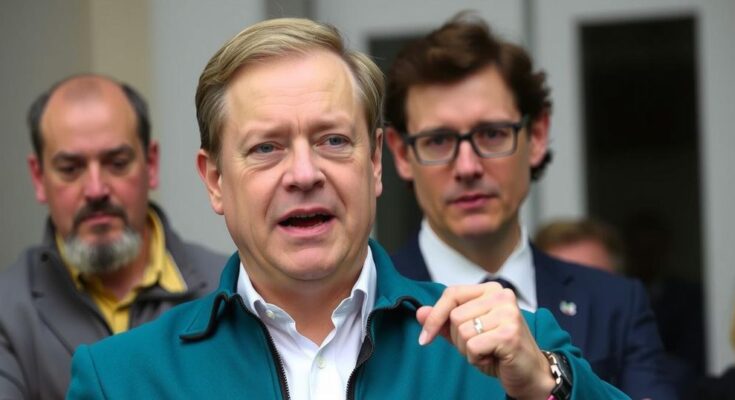Elon Musk’s endorsement of the far-right AfD party has caused outrage in Germany, leading to a major newspaper’s opinion editor resigning in protest. Government spokesperson Christiane Hoffmann stated that Musk aims to influence the federal elections while also pointing out that the AfD is under surveillance for right-wing extremism. His remarks sparked a debate on free speech and foreign influence ahead of early elections set for February 23.
On Monday, the German government attempted to mitigate the repercussions of Elon Musk’s recent support for the far-right Alternative for Germany (AfD) party, as he reiterated his endorsement in an opinion piece for a major German newspaper. This endorsement led to substantial backlash, including the resignation of the paper’s opinion editor. Government spokesperson Christiane Hoffmann remarked on Musk’s influence, stating that “freedom of expression also includes the greatest nonsense,” while also acknowledging Musk’s attempt to sway the federal elections. Hoffmann further emphasized that the AfD is under surveillance by Germany’s domestic intelligence for right-wing extremism, recognized as such in certain states.
Germany is approaching an early election scheduled for February 23, following the disbandment of Chancellor Olaf Scholz’s governing coalition amidst economic disputes. Musk’s recent commentary positions the AfD as a beacon of hope, suggesting that the party could usher in a future of economic prosperity and innovation. His commentary, however, raises questions about free speech and resulted in a heated debate within German media. The AfD enjoys substantial polling; yet, its leader, Alice Weidel, faces significant challenges in assuming the chancellorship due to collective resistance from other parties.
In his article, Musk contended that the AfD’s image as a right-wing extremist party is misleading, citing Weidel’s same-sex partner as an example to challenge this perception. His statements provoked criticism, leading to the resignation of Eva Marie Kogel, the paper’s opinion editor, who publicly expressed her discontent via Musk’s platform X. Additionally, Jan Philipp Burgard, the future editor-in-chief, contributed a critical piece alongside Musk’s opinion, highlighting the flaws in suggesting that only the AfD could resolve Germany’s issues.
The political landscape in Germany is currently tense, with an early election scheduled for February 23, following the collapse of the current governing coalition. The rise of the AfD as a significant player in German politics is concerning to many, particularly in light of its categorization as a right-wing extremist party by intelligence services. Elon Musk’s increasingly public support of this party has prompted scrutiny regarding foreign influence in national politics and the impacts of free speech in the media landscape.
In summary, Elon Musk’s endorsement of the far-right AfD party has ignited a significant controversy in Germany, leading to the resignation of a prominent opinion editor and raising important questions about free speech and foreign involvement in political discourse. The German government has sought to downplay Musk’s influence amid ongoing concerns about the AfD’s extremist reputation and the upcoming elections, framing a broader debate on the nature of public discourse and national integrity.
Original Source: www.voanews.com




